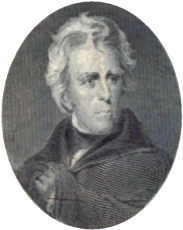By Gale Courey Toensing
At the umpteenth Republican debate in front of a packed audience at the Myrtle Beach Convention Center in Myrtle Beach, South Carolina, on January 16, Gingrich conjured up the spirit of Andrew Jackson, America’s seventh president, as a model for the way the U.S. should approach its “enemies” today.
“We’re in South Carolina,” Gingrich told the crowd, as if they needed to be reminded of where they were. “South Carolina and the Revolutionary War had a young 13-year-old named Andrew Jackson. He was sabred by a British officer and wore a scar his whole life. Andrew Jackson had a pretty clear cut idea about America’s enemies: Kill them!” The crowd roared its approval.
Although Gingrich’s spiritual journey has taken him through a cafeteria of Christian variations from Lutheranism to being a Southern Baptist to his current status as a Catholic, there is no sign of Christian forgiveness or mercy in his appropriation of Jackson’s attitude toward “enemies.”
Jackson, historians and just about every American Indian in the universe will recall, was the architect of the Indian Removal Act, America’s legalization of ethnic cleansing. He signed the legislation on May 28, 1830. The Indian Removal Act resulted seven years later in the removal of 46,000 Indigenous Peoples from the lands east of the Mississippi, and opened up 25 million acres of land “to white settlement and to slavery,” according to PBS. The area was home to the Cherokee, Creek, Choctaw, Chickasaw and Seminole nations.
By Amargi
Andrew Jackson was a wealthy slave owner and infamous Indian killer, gaining the nickname “Sharp Knife” from the Cherokee. He was also the founder of the Democratic Party, demonstrating that genocide against Indigenous People is a nonpartisan issue. His first effort at Indian fighting was waging a war against the Creeks. President Jefferson had appointed him to appropriate Creek and Cherokee lands. In his brutal military campaigns against Indians, “Andrew Jackson recommended that troops systematically kill Indian women and children after massacres in order to complete the extermination.” The Creeks lost 23 million acres of land in southern Georgia and central Alabama, paving the way for cotton plantation slavery. His frontier warfare and subsequent “negotiations” opened up much of the Southeast U.S. to settler colonialism.
But the massacres at My Lai and all the forgotten My Khes in Vietnam had a basic continuity with those of Moros on Jolo and of Filipinos on Samar at the turn of the century, and of Native Americans on the main land earlier—all the Wounded Knees, Sand Creeks, and Bad Axes. That linkage of atrocities over time and space reveals underlying themes and fundamental patterns of the national history that lawmakers, generals, and so many other compatriots were eager to forget.
The recent video of Marines urinating on the dead bodies of supposed Taliban fighters follows the long tradition of defecation upon and mutilation of Native People by U.S. Soldiers. Rick Perry, another Republican Presidential candidate, shared his insight into the matter, revealing the predator nature of colonialism and U.S. Empire. Arguing in defense of the Marines he maintained that when you are in war, things like this happen. Apparently, “history kind of backs up” peeing on corpses and, “to call it a criminal act, I think, is over the top.”
I think Andrew Jackson would be proud that his example would still inspire Marines today.
That Gingrich thinks Indians were (and are?) savages who deserve killing is stereotypical if not racist thinking. For that he gets a Stereotype of the Month nomination.
For more on the subject, see Indians, Terrorists = US Enemies and Seminoles Compared to Al Qaeda.


Sieg heil, Newt. Seriouisly, Andrew Jackson? Couldn't there be someone a little more inspirational? A Washington, a Jefferson, a Lincoln, a Teddy Roosevelt, an Eisenhower, or even (if you're a Republican with amnesia, trolling, or just stupid) a Reagan?
ReplyDeleteCertainly the fact that I just named four Republicans and not a single Democrat (unlike Newt, who named one Democrat, the first Democratic president in fact) says something. It says I should be a Republican strategist, if I weren't a Democrat.
I mean, first, Jackson's a Democrat (and therefore a bad choice for Newt to invoke except in Neoconfederate Crazyland). Secondly, how many people consider Jackson a hero? Not many. Jackson's removal of the Cherokee is considered the iconic atrocity of Indian removal, and it's all anyone remembers about him.
Dammit, can't pothole for some reason.
Ergo he conjured up Andrew Jackson's idea of dealing with America's "enemies" of today. But in hindsight, it had nothing to do with "injuns". The greatest threat to our National Security are:
ReplyDelete1.) Al-Queada Terrorists and extremists with associated beliefs/intentions.
2.) Homegrown Domestic Terrorists: i.e. White Supremacists, "Sovereign Citizens" and other anti-government loons.
And btw, I loved how Rommey dissed Gingrich in last night's debate in Florida.
I wonder if the Democrats will stop using Jackson is one of their two major inspirations/emblems.
ReplyDeleteAs for Jackson's policies (Trail of Tears, etc), they were typical socialism: the ruling elites ignoring any of the right of individuals and trampling them.
Sounds like you don't know the definition of socialism, Anonymous #2. As for the substance of Jackson's policies, it's more correct to say he favored the individual rights of Americans over the collective rights of Indian tribes.
ReplyDeleteIn many ways, he'd fit it nicely with today's conservative teabaggers. You know, with their alleged concern for states' rights masking their racial and religious bigotry.